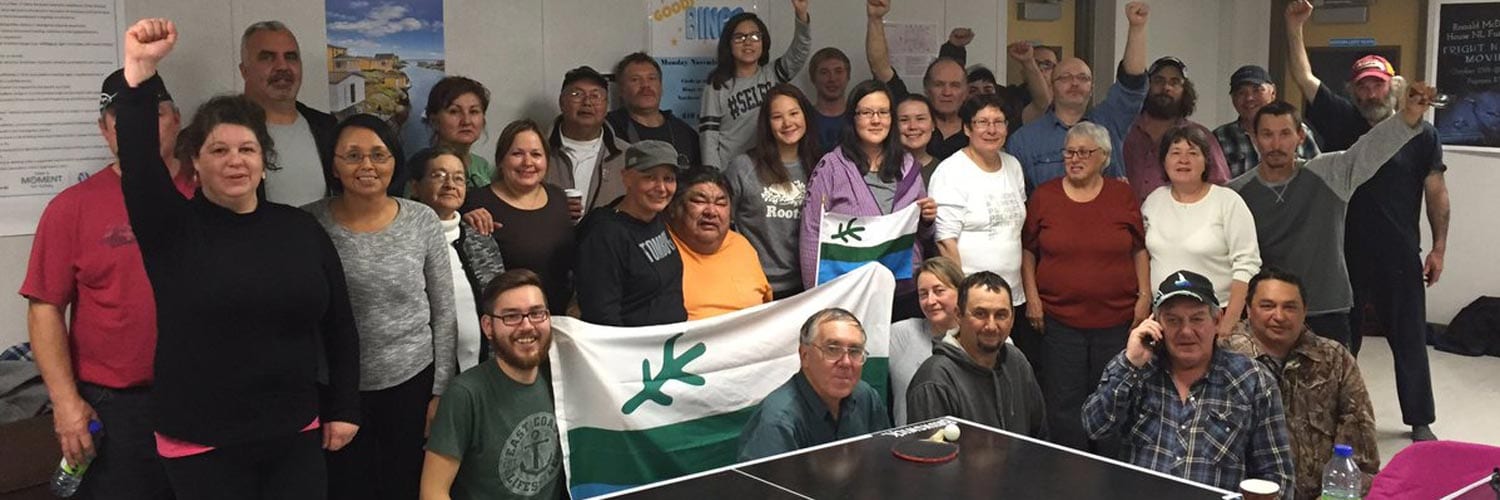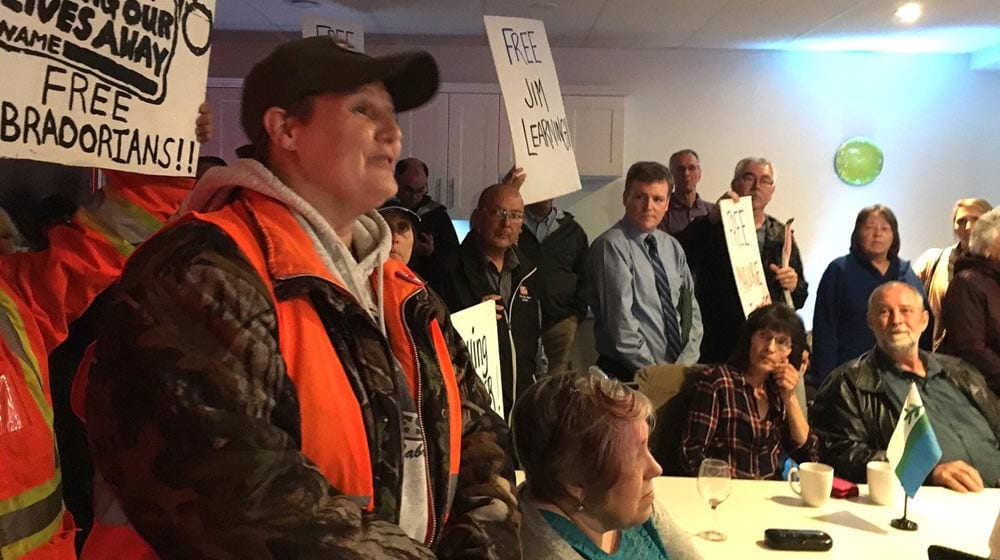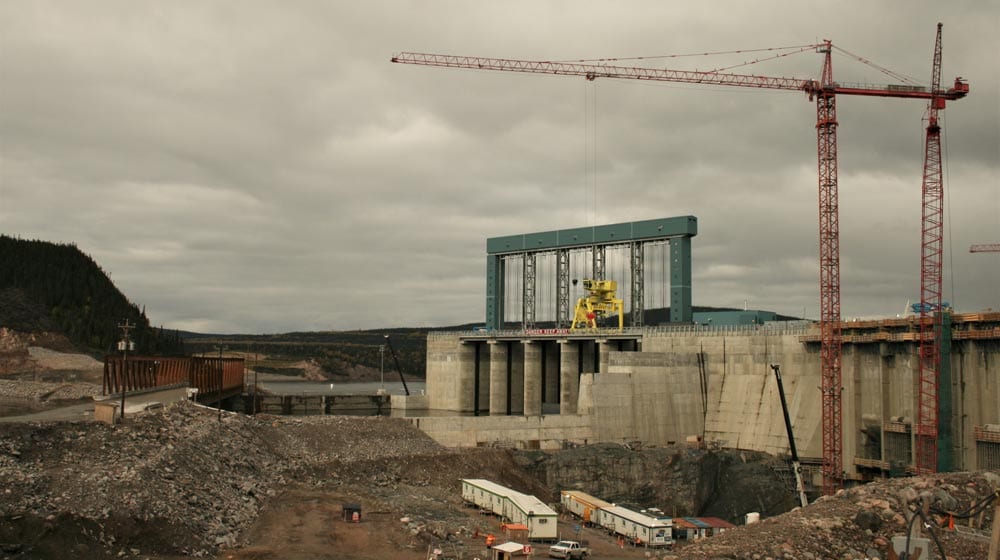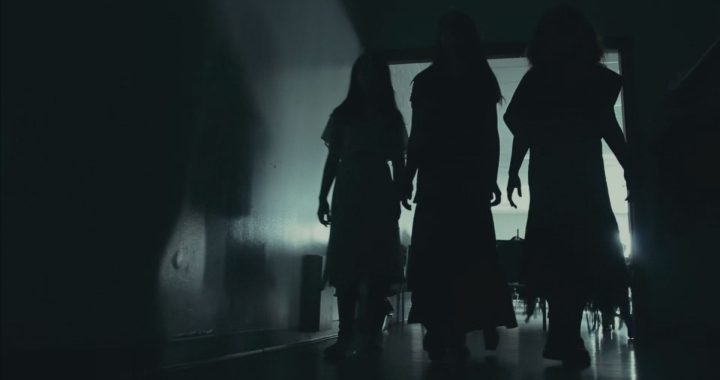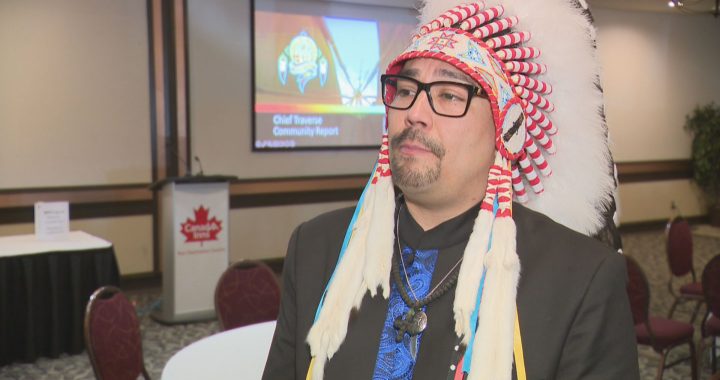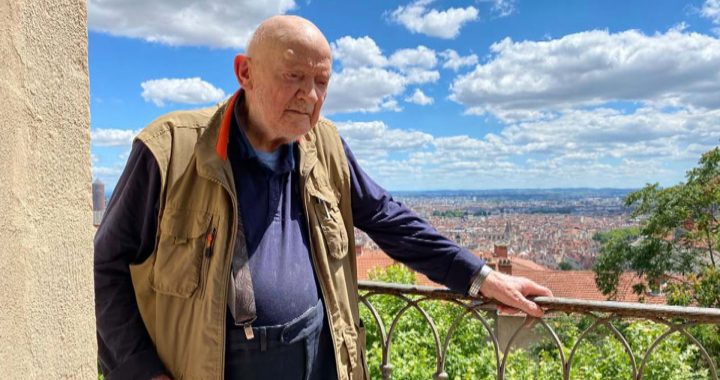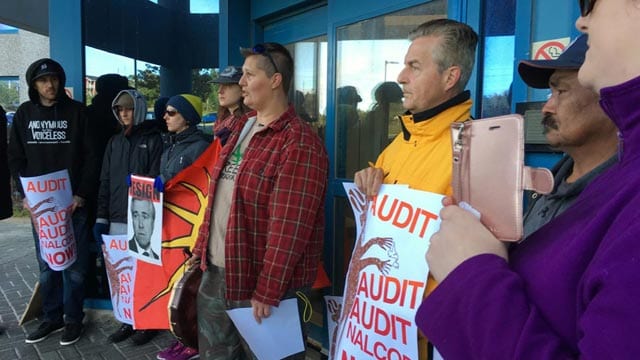
(Denise Cole, centre, at a Muskrat Falls protest at Nalcor headquarters in St. John’s, NL. Photo: Trina Roache/APTN)
Labrador Land Protector Denise Cole expects Nalcor, the provincial agency responsible for building the Muskrat Falls hydroelectric dam, will use her as an example to discourage others when her case goes to trial.
“They want to show an example that yes, all laws apply to all people with regards to who they are,” said Cole, who said she has Inuit heritage.
About 20 land protectors will be in court this week for hearings related to the occupation, blockade and other protests of the Muskrat Falls project in Labrador.
In October 2016 some of them breached a court order to stay away from the site. On Oct. 22 of that year, around 50 people entered the site and occupied a worker accommodation complex.
(Land protectors occupy the offices of Nalcor at the Muskrat Falls hydroelectric project site in October 2016. Photo: TheIndependent.ca)
Cole said she’s not just protecting the environment, she is protecting her rights to ceremony.
“I am very much a believer when I take my medicines, when I take my drum, what colonial law would call protesting is very much what I consider is ceremony,” said Cole.
For a number of years, Cole has gone to Muskrat Falls for ceremony.
She said she considers it to be a sacred place with a sacred history and feels a responsibility to Indigenous culture and traditions, and the injunction is blocking her right to practice ceremony.
She has three civil charges for breaking the injunction dating back to May and June of 2017 and has pleaded not guilty.
Cole is appearing in court this week.
“I can be respectful to judge in court and police officers, but I cannot allow them to be more important than creator and my values and my spiritual beliefs.”
She said she has a responsibility to Muskrat Falls and Indigenous laws.
“The judges says we have to uphold the rule of the law, what about the rule that we take care of mother earth for the next seven generations?” Cole said.
She said sacred rules don’t fit into the colonial system and wants to tell that to the court.
“I want the opportunity to speak and explain why I am where I am and why I won’t plead guilty to doing what I know is a sacred responsibility,” said Cole.
Because of the number of Labrador Land Protectors who have hearings, the court needed to be booked four times.
So far, one group has already appeared in court.
Labrador Land Protector Lawyer Mark Gruchy asked the court to hold the hearings in groups, otherwise it would take too long.
“This is a grass roots reaction, it was extremely broad based. I was dealing with people ranging in ages from 16 to 65,” Gruchy said.
The first group consisted of eight protectors.
They all pleaded guilty to civil contempt. Three received suspended sentences and their conviction will be registered against them due to prior violations, and the other five were granted a conditional sentence.
All eight have to obey conditions to stay away from the site.
Cole hopes they were able to get some closure.
“People are heroes who stood up for what they believed in. In the face of a government who is hell-bent in moving forward with the project,” she said.
The entire community is involved, Gruchy said Indigenous and non-Indigenous people are reacting to threats which are similar threats that have manifested against Indigenous and rural people decades before.
Methylmercury is still in people’s memories.
As a child, Gruchy remembers people’s concerns with methylmercury.
“I saw pictures of Indigenous people who had been poisoned by mercury poisoning and fish and what it had done to their children,” he said.
Gruchy asked the court to acknowledge reconciliation in passing sentence. He said reconciliation is becoming more acknowledged and embraced in courtrooms and recognizing the past inequalities enhances the rule of the law.
“Systemic major disconnects and abuse between settler and indigenous communities led to this mess in all areas of law,” Gruchy said.
However, he feels corporations seeking injunctions against people protecting the environment is not helpful in moving forward.
“This is a social and ethical dimension, which is colliding with a legal dimension… should corporations be seeking injunctions for these reasons?”
Gruchy said he also appealed to the court.
“Basically, what I am doing is trying to affirm the moral basis for their actions in submissions and the judge is not resisting at all.”
Cole was pleased that the court acknowledged reconciliation but said, “We are a long way from decolonizing, a long way from having courtrooms that honor Indigenous values.”
She hopes to be found not guilty and does not think the court wants to send anyone to jail but will accept the decision.
“No one said it was going to be easy to walk a sacred path, we just know it’s the right thing to do,” she said.
The hearings for those facing civil charges are Sept. 19, 20, 24, and Oct. 22-26, while those facing criminal charges will appear on Nov. 19.
Muskrat Falls Inquiry underway
Indigenous leaders testifying at the Muskrat Falls inquiry in Happy Valley-Goose Bay today are sharing their historical connection to the Churchill River, where the massive Labrador dam will eventually harness power.
Carl McLean, speaking on behalf of the Nunatsiavut government, opened the day’s proceedings with an oral history of the Labrador Inuit‘s use of the river and continued reliance on the waterway for food, travel and lodging.
Representatives from the Innu Nation, NunatuKavut Community Council and the Quebec-based Conseil des Innus d’Ekuanitshit are also scheduled to testify on the river’s importance to their communities.
The independent inquiry, led by provincial Supreme Court Justice Richard LeBlanc, will examine how the hydroelectric project was approved and executed, and why it was exempt from oversight from the Public Utilities Board.
Indigenous leaders also plan to testify later in the inquiry about their concerns over the potential threat of methylmercury poisoning in local wild food sources downstream.
Hearings began Monday and will conclude in August 2019, with a final report expected by Dec. 31.
-with files from the Canadian Press
Correction: A previous version of this story stated eight land protectors who appeared in court earlier this month pleaded “not guilty”. They in fact pleaded guilty.




